If you don’t know what a Berkeley SE 492 is, don’t feel bad about it. I’d never heard of of one either. All of us that are car people don’t want to admit that something slipped in under our radar but it happens all of the time. That being the case, let’s dig through this 1958 example and see what we can learn. It is located in Morgan Hill, California, and is available here on craigslist for $6,900. Thanks to MattR for this tip!
Berkeley Cars produced small, open, two-seater FWD cars between 1956 and 1960 at their Bedfordshire, England plant. Total five-year production was about 4K units but most notably, they were powered by motorcycle engines. The SE 492, our subject, saw about 660 units built over an eighteen-month period. All SE 492s were open cars though there was a fixed roof model planned and a prototype created. It never saw production, however.
There is not a lot of detail accompanying this Berkeley. The seller states that it is powered by a Suzuki GT 550 three-cylinder engine but he does have the original 492 CC Excelsior motor (30 HP) included with the sale. The seller adds, “Lots of spare parts. Runs and drives, but still needs some sorting.” The original transmission was a four-speed manual affair but it’s unknown what is currently in place.
There are no included images or details surrounding the interior but it seems reasonable to assume that it will accommodate two very small individuals or maybe one and a half normal-sized person. It would be interesting to know how much leg-room there is under the dash – it’s possible that is a very limiting factor thereby eliminating a sizable percent of the population of potential buyers.
The fiberglass body of this Berkeley seems to be in pretty good shape, there are no signs of cracks or seam separation other than some trouble with the front roll pan, beneath the grille. There is also evidence of several previous colors that adorned this two-seater so the rich red finish was probably applied in more recent times.
This is a curious little car with emphasis on “little”. Not to harp on the size issue, but assuming that one could fit in it and work the controls, it would probably be a great deal of fun to scurry about. I think what is most perplexing is what would make one think of creating a motor-cycle powered, fiberglass mini-sports car in the first place as opposed to going a more traditional route. Perhaps the lack of a wet cooling system was the attraction and the draw to design such a vehicle. Whatever the case, if you’re interested in this unique, rare sports car, you may want to verify the size first.
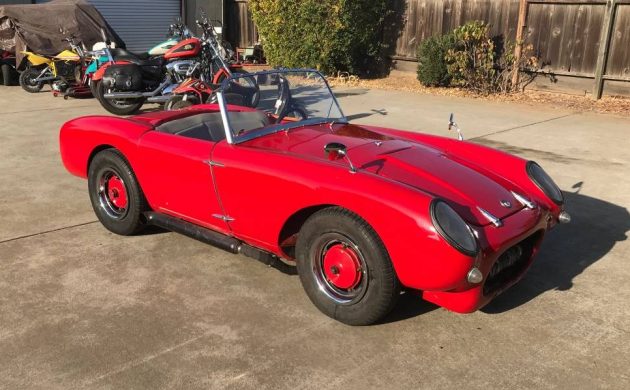
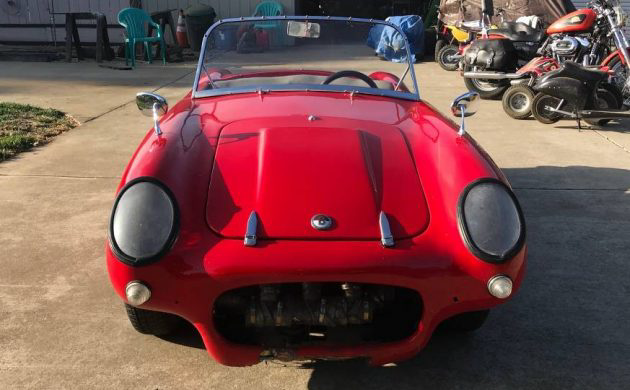
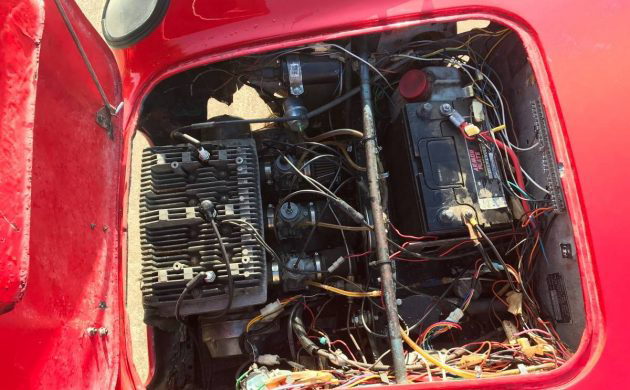
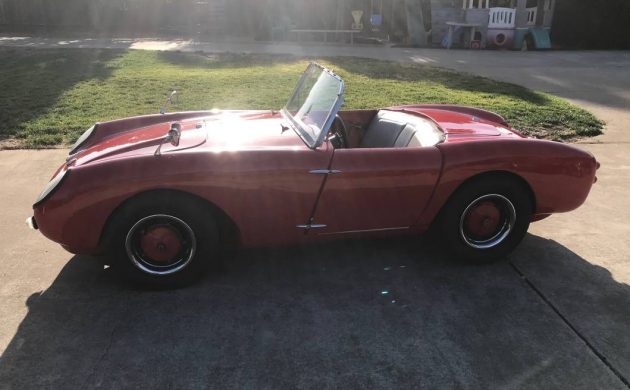
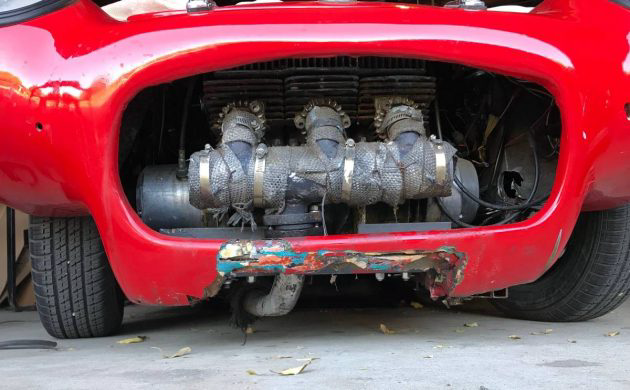
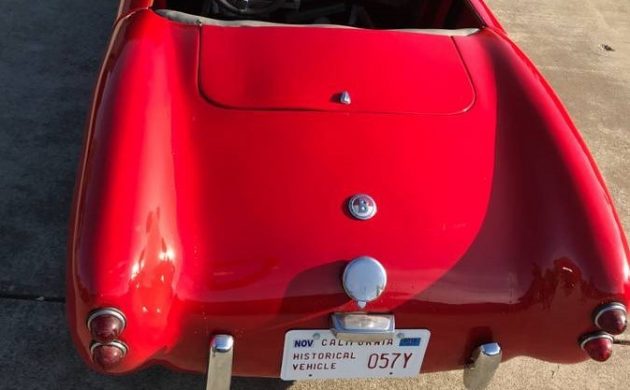



These are neat little cars… just too small. Jay Leno has one and I do not know how he gets in and out of it. Makes our Sprites look huge. This is a nice car.
The thinking behind these in England was that they were an alternative to a motorbike. The early Berks were three wheeled and thus could be licensed as a motorcycle.
The 3-wheeled Berkeleys (called the T60) were actually the last car that Berkeley released in any sort of notable quantity. The original designer of the Berkeleys (Lawrie Bond) was completely against the idea of a 3-wheeled version, as it ruined the lines and feel of the car. Berkeley produced it anyways to take advantage of the tax breaks for 3-wheelers, as well as being able to drive them on a motorcycle license. It ended up being the best selling model, even though it strayed from the ethos of the Berkeley sports car.
In order of production, the primary models were the SA322, SE328, SE492, B95, B105, and T60. There were a small number of 4-seater variants produced of a few models, and Berkeley basically re-released the SE328 with a 4-speed and the 492 body at the VERY end of their automobile production, calling it the B65, but only about 20 were made. The Bandit was their last ditch effort to keep things going by moving into a more ‘mainstream’, larger sports car market, but sadly the car never reached production as Berkeley was forced to close the doors. They did make 2 prototypes of the Bandit to take to shows and let the press check out, however. Judging by what the original reviews said, it would’ve been an excellent car.
They are fantastic little sports cars, though it is a bit of a shame that so many of these rare little cars were butchered through the years for all types of various drivetrain and suspension transplants, but luckily the Berkeley Enthusiasts Club is available to help restore them back to their original glory! An invaluable resource, for certain.
I just got the 1959 B65 in a horse trade dont know much about it looking to get investment back all parts are there
These are great little machines.
Whoever wired this one was looking for long term job security.
What a mess of spaghetti with no wire color reference that makes any sense at all.
I was going to mention, some zip ties and wire wrap would do wonders to make it look at least a little bit more civil under the hood. I couldn’t even stand one of the racecars looking that jumbled, it hurts my head just looking at it.
As an owner of several of these cars, I can speak a bit to room for a driver/passenger for those who may have concerns stemming from the write up posted. I am 6’2” and fit in the cars fine, though I am quite slim at around 145 pounds. 34” inseam and size 12 shoes, and I find there to be sufficient room everywhere important, keeping in mind that they are obviously quite small cars, so expectations should be kept realistic. I also have many cars that are notably smaller than the Berkeleys, though, so my tolerance for a cozy cabin is likely much higher than the average Joe.
One thing I would note is that I find the slant-edge door cars (like this car) to be a bit more challenging to get in and out of than the later straight-edged door cars, but that is largely alleviated in this example by having the smaller diameter steering wheel installed (the original Standard 8/10 derived wheel is very large). For someone overweight or a bit stiff in the joints, I could see it being quite a bit more daunting to get in and out of, no matter their height.
With a passenger, it can be a snug fit, but doable. I’ve done a drive or two with people similar in height to me, but double my weight, which was about the limit, width wise. With two slimmer occupants, it’s much more reasonable. Someone you know well is certainly ideal, otherwise shifting can be a bit awkward.
Tyler:
Great input, thx!
JO
Hmmmm….screaming for hayabusa motor. Then you really can go out and challenge the big boys.
A Hayabusa engine would be interesting! However, I
don’t believe that a .318 Poly swap would add anything positive to this vehicle…
How the heck do you think this car would even stay in one piece with a 170hp motor, thats a 600% increase over factory.
Im thinking a nice 3 cyl two stroke would be fitting… kind of like a melkus or a saab
Hmmm…, I had a Suzuki GT550 back in the late ’70’s (oops, just dated myself). For the day, a pretty hot performer. Main drawback, 2 stroke, so you have to watch the 2 stroke oil supply. Do not want to run out of the 2 stroke oil.
i believe the original Berk had a 360 cc Villiers 2-stroke engine. Villiers gave 2-strokes a bad name, they produced backward junk for all intents and purposes. With the Suzuki mill, this could be a real pocket rocket. The Suzuki 2-strokes were based on DKW and Adler designs – and the Japanese did a bang-up job. The wiring needs a complete re-do since in its present configuration it´s a nightmare. I drove one of these in Fort Hood back in the days of heady youth and loved it I even more than my buddy´s great little Bug eyed Sprite
While several British microcars did use Villiers engines (including Lawrie Bond’s original brainchild, the Bond Minicar), the Berkeleys never did. They used the 322cc Anzani UniTwin (2-stroke), 328cc Excelsior Talisman twin (2-stroke), 492cc Excelsior Talisman triple (2-stroke), 692cc Royal Enfield Super Meteor twin (4-stroke), and the 692cc Royal Enfield Constellation twin (4-stroke).
I have the small block, the 328 ha ha. They are surprisingly roomy.
The impetus for the creation of the car was taxes. Many cars with low engine displacements were creatures of the tax schemes in Britain and elsewhere because for a while, displacement and hp was the driving force behind taxation. In fact you sometimes see cars called the “XXX 70/110” or some such. That means the taxable hp was 70 but the mfr claimed 110 “real” hp.
And that is today’s economic lesson – taxes distort economies.
Thank you Tyler for the correction. I love to learn. The Berk must have been a real screamer with the big Royal Enfield mill.
My first Berkeley had the 692cc Royal Enfield ” Constellation ” engine with 50bhp. This B – 105 model ( and it’s 40bhp brother, the B – 95 ) had a totally different front end, to accommodate the tall OHV engines. Cruising at 85mph on skinny 12″ cross – ply tyres was maybe risky, but when you’re ( a ) 19 years old, & ( b ) in the Military – living dangerously was just fun ! Back in 1964 I created the International Berkeley Enthusiasts Club ( now the B.E.C. ) which helps owners across the World to restore or improve these rare sports cars.
Short video from The Automobile magazine featuring a restored Berkeley B95 and the man who restored it from a rough car purchased for £150.
Berkeley’s barchetta – A Royal Enfield-powered B95 – YouTube
youtube.com/watch?v=XCDrTJrdjPE
Bad video link. Here’s the full list. Berkeley #12 on list. Several other such as The Trojan Utility #2 and Intelligent Design – The 1923 Gerin Prototype #9 are fascinating:
http://www.theautomobile.co.uk/videos/
Here’s the starting routine on my green 492cc: turn on the ignition. This allows the electric fuel pump to pressurize the system. Open the hood. Depress the button on each carburetor; that pushes down the float and lets gas into the throat of the carb. When gas runs out the throat (there were no air cleaners) of all three carbs, close the hood, get back into the car, and press the start button. The Ciba Dynastart was on the crankshaft (no reduction gear, no solenoid) so the engine was instantly running.
Roger Buck. Back in the 1950’s and early 60’s, in the U.K., that procedure with motorcycle carburettors was called ” tickling the carbs ” as gas ( petrol ) was gravity fed. My first Berkeley had a rear fuel tank and switching on the ignition activated the fuel pump, which primed the single AMAL TT.10 carb …… so I stayed behind the wheel and pressed the starter ( the noisy old Bendix drive type
– my NSU 600 used the smoother Dynastart, like the two – stroke Berkeleys.
Martin:
two additional comments:
1. I still have the 1.25 gallon flat gas tank with an oil measuring tube attached to the cap that I used to mix oil with the gas for the Berkeley, I use it for the two stroke yard equipment.
2. The fiberglass body had a flat bottom, with the suspension arms sticking out of slots in the side. Rochester NY has a lot of snow. It was fun charging a snowbank and gliding over it like a toboggan.
One of the most confusing bunch of statements remarked I’ve read since I’ve been visited this website. Maybe some more pictures might have made things more clear. I also don’t understand why there is so much wiring in the engine department.